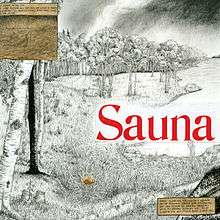Uplift
Uplift may refer to:
- Uplift Universe, the setting for a series of novels by David Brin in which Biological Uplift is a central aspect

Tectonic uplift
Tectonic uplift is the portion of the total geologic uplift of the mean Earth surface that is not attributable to an isostatic response to unloading. Whereas isostatic response is important, an increase in the mean elevation of a region can only occur in response to tectonic processes of crustal thickening (such as mountain building events), changes in the density distribution of the crust and underlying mantle, and flexural support due to the bending of rigid lithosphere.
It is also good to take into consideration the effects of denudation (processes that wear away the earth's surface). Within the scope of this topic, uplift relates to denudation in that denudation brings buried rocks closer to the surface. This process can redistribute large loads from an elevated region to a topographically lower area as well – thus promoting isostatic response in the region of denudation (which can cause local bedrock uplift). The timing, magnitude, and rate of denudation can be estimated using pressure-temperature studies.
Uplift (science fiction)
In science fiction, uplift is a developmental process to transform a certain species of animals into more intelligent beings by other, already-intelligent beings. This is usually accomplished by evolutional interventions like genetic engineering but any fictional or real process can be used. The concept appears in David Brin's Uplift series and other science fiction works.
History of the concept
The concept can be traced to H. G. Wells' novel The Island of Doctor Moreau (1896), in which the eponymous scientist transforms animals into horrifying parodies of men through surgery and psychological torment. The resulting animal-people obsessively recite the Law, a series of prohibitions against reversion to animal behaviors, with the haunting refrain of "Are we not men?" Wells' novel reflects Victorian concerns about vivisection and of the power of unrestrained scientific experimentation to do terrible harm.
Other early literary examples can be found in the following works:

Sauna
A sauna (/ˈsɔːnə/ or /ˈsaʊnə/;Finnish pronunciation: [ˈsɑunɑ]) is a small room or building designed as a place to experience dry or wet heat sessions, or an establishment with one or more of these facilities. The steam and high heat make the bathers perspire. Saunas can be divided into two basic types: conventional saunas that warm the air or infrared saunas that warm objects. Infrared saunas may use a variety of materials in their heating area such as charcoal, active carbon fibers, and other materials.
Etymology
The word sauna is an ancient Finnish word referring to the traditional Finnish bath and to the bathhouse itself. In Baltic-Finnic languages other than Finnish, sauna does not necessarily mean a building or space built for bathing. It can also mean a small cabin or cottage, such as a cabin for a fisherman.
History
In Mexico and Central America, more specifically in the highlands of central and southern Mexico and Guatemala, there is a version of the sauna indigenous to the Americas, called a temazcal. It is the Mexican, Central American version of the sweat lodge used by indigenous peoples of the Americas, though the temazcal is usually made of clay or stone rather than wood.

Sauna (Mount Eerie album)
Sauna is the seventh full-length album by Mount Eerie (aka Phil Elverum). It was released on February 3, 2015.
Concept
Upon announcing Sauna, Phil Elverum said that the album was inspired by "Vikings and zen and real life". On his label's website, Elverum had this to say about the title:
"The sauna that this album was inspired by is not a sauna that actually exists anywhere. It is about the idea of a small man-made wooden room crushed beneath a universe’s worth of bad weather; a concentration of extreme heat within a vast tough world. Inside this deliberate space a transformation occurs. The exaggerated atmosphere of flames, steam, smoke and dim light obliterate the usual sensations and new kinds of perception are exposed. Then the shocking plunge under cold water and the razor sword through sky."
"All of the song titles are single words and some of the songs are very long," he said in a press release, "This is music meant to weigh heavy on you like a lot of cold water at night, and also the sword glimmering at the bottom of the lake at night.”

Sauna (film)
Sauna, also known as Filth or Evil Rising, is a 2008 Finnish horror film directed by Antti-Jussi Annila.
Plot
In 1595, after a long war between Sweden and Russia, brothers Knut and Eerik are marking the border between Finland and Russia. When they are crossing a swamp, a young girl, whom they left to die earlier, begins to haunt them. The brothers, seeking forgiveness, arrive at village, where they find a sauna that may help them to wash their sins away.
Cast
References
External links
Opposite
Opposite may refer to:
Basic meanings
Film and TV
Music
Albums
Songs
See also
Podcasts:

